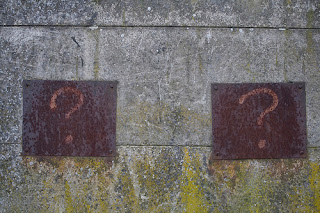
Last week we mentioned something important Sunni Mercer said:
Good art asks a question.
In other words, you want your artwork to raise a question in the minds of your viewers. As you formulate an overall concept for your project, try to keep this goal in mind.
This is especially important for the work we're doing because, for us, the purpose of the art project isn't just the end-product but the whole process of using art to help us think about subcultures in a different way. Your journal should contain many pages of pondering and brainstorming related not only to the artwork but to the places we're exploring--what they look and feel like, and why; what you know about them, what you'd still like to learn, what you many never know . . . and why; how a place gets "redeemed" or neglected or forgotten, . . . . all this writing and thinking should raise questions in your mind about the places we're studying. And at least one of those questions should somehow get embedded in your artwork so that you are giving your viewers something to think about as well as something to look at.
As you read through Julie's Project description a couple of posts down, notice the kinds of questions or thoughts her artwork might raise in the minds of her viewers. On one level it's a representation of Deep Deuce, but on another level it's a visual composition that gives us lots of food for thought.
Image source: loneblackrider
3 comments:
As I am working on my project descriptions, I find that there are many things that I would like to discover and learn more about. This course is revitalizing my love of history and restoring my desire to acquire more knowledge. It is truly the journey and not the destination. Thank you for providing such descriptive narratives and visual images. I hope that there will be additional courses in the future similar to this type of format. Debbie Boles
Thanks for the kind words, Debbie. This course--and, quite sincerely, all the wonderfully enthusiastic and dynamic people in it--are making me want to do this kind of work again and to keep experimenting with formats and approaches. I'm grateful to Julie for introducing me to weekend teaching and to the neat possibilities for culture studies classes in OKC.
A couple of other things. You'll want your project to have some kind of "hook" or overarching theme to help guide it. Also, make sure also that in your projects that you consider the broader historical/social/political/
economic milieu (what was going on in the world that was shaping the area's evolution over time and the experiences of the people living/working/in the area. You will need this to provide context for your work and be prepared to explain it (as well as defend it) during your presentations).
Post a Comment